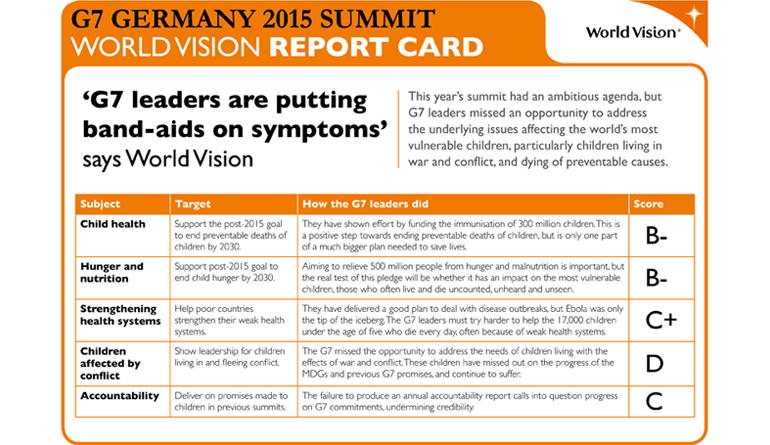‘G7 Leaders are Putting Band-aids on Symptoms,’ says World Vision
Media Contact :
June 19, 2015
Senior Public Relations Manager
[email protected]
m 202-679-1620
Media Contact :
June 19, 2015
Senior Public Relations Manager
[email protected]
m 202-679-1620

GARMISCH-PARTENKIRCHEN, Germany (June 8, 2015) — This year’s G7 meeting at Schloss Elmau will be remembered as one that did not deliver on its ambitious agenda that could have had an historical impact for the world’s most vulnerable children, especially those in conflicts.
“After last year’s makeshift summit following the suspension of Russia, leaders really needed to deliver this year to demonstrate the value of these Summits, but they were too distracted by immediate crises,” says Chris Derksen-Hiebert, World Vision’s policy director. “Ebola, Ukraine, Greece and Syria are concerning issues, but G7 leaders are only putting band-aids on symptoms of root causes that are putting millions of children’s lives at risk.”
“The G7 leaders missed an opportunity to lead the way for the future of children, especially those living with the effects of war and conflicts, and dying from easily preventable causes,” says Derksen-Hiebert.
“With the Millennium Development Goals (MDGs) expiring this year and a new set of goals being developed, this weekend was a historical opportunity to have a lasting impact for children who live and die unseen and unheard. But they failed to deliver.”
“We came into this year’s meeting calling for tangible commitments for the world’s most vulnerable children and despite addressing issues like hunger and immunization, it was nowhere near as ambitious as we would have hoped for.”
Based on previous G7 priorities and commitments, World Vision challenged leaders to deliver in five areas this year.
“On child and maternal health, we said they needed to support the post-2015 goal to end preventable deaths of children by 2030. They have shown effort by funding the immunization of 300 million children, but immunization is only one part of a much bigger plan needed to save lives.”
– Robert Zachritz, World Vision’s Vice President, Advocacy & Government Relations
“On hunger and nutrition, we said they needed to support the post-2015 goal to end child hunger by 2030. Aiming to relieve 500 million people from hunger and malnutrition is important, but the real test of this pledge will be whether it has an impact on the most vulnerable children, those who live and die unseen, unheard and uncounted.”
– Robert Zachritz, World Vision’s Vice President, Advocacy & Government Relations
“After the horrors of Ebola, we said they needed to support poor countries to strengthen their weak health systems so children can access lifesaving health services. They have delivered a good plan to tackle disease outbreaks, but Ebola was only the tip of the iceberg. The G7 leaders must try harder to help the 17,000 children under the age of five who die every day, often because of weak health systems.”
– Robert Zachritz, World Vision’s Vice President, Advocacy & Government Relations
“On children living with war and conflict, we said they needed to step up for them in this important year. The G7 missed the opportunity to address the needs of these children, who have missed out on the progress of the MDGs and previous G7 promises, and continue to suffer.”
– Robert Zachritz, World Vision’s Vice President, Advocacy & Government Relations
“On accountability, we said they needed to deliver and fulfil promises made to children in previous summits. The failure to produce an annual accountability report calls into question progress on G7 commitments, undermining credibility.”
– Robert Zachritz, World Vision’s Vice President, Advocacy & Government Relations
– END –
About World Vision:
World Vision is a Christian humanitarian organization conducting relief, development, and advocacy activities in its work with children, families, and their communities in nearly 100 countries to help them reach their full potential by tackling the causes of poverty and injustice. World Vision serves all people regardless of religion, race, ethnicity, or gender. For more information, please visit www.WorldVision.org/media-center/ or on Twitter @WorldVisionUSA.